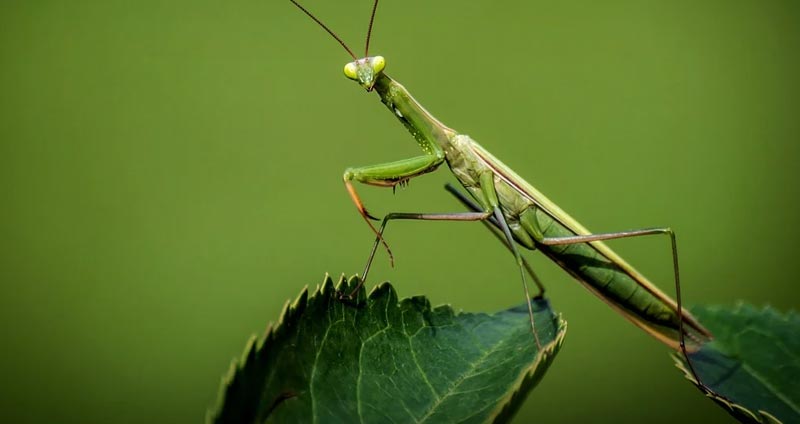Many would consider seeing a praying mantis good luck. After all, it’s known for its ‘praying’ hand. This creature’s forelegs are positioned as if in prayer, hence the name.
However, there’s a certain question to be asked regarding this elegant, pious creature. For how long will it remain in your company?
So, what’s a praying mantis lifespan? In this article, we’ll explore this very question.
How Long Is a Praying Mantis’ Lifespan?
Most mantises’ lifespans range from six months to a year. Now, the exact duration of each individual mantis’ lifespan depends on several factors. One of them is species, while another important one is the external environment.
Different kinds of mantises have different lifespans. Yet, there isn’t too steep a variation between each one’s lifespan (as long as they belong to the same breed!)
Lifespans of 7 Types of Mantis
Each mantis has special characteristics unique to its breed. Whether your mantis is going to live for 6 or 18 months depends on its type. Let’s explore some common breeds to be found around.
European Mantis
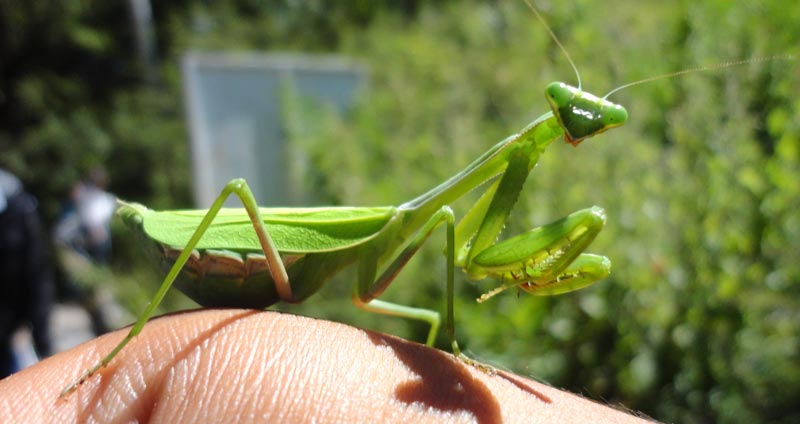
This mantis’ scientific name is Mantis religiosa. The Latin word ‘religiosa’ translates into ‘the religious’ in English. While other fellow mantises assume this prayer-like pose, the European mantis is associated with it the most.
The longest such a mantis can live is one year. However, this isn’t always the case. A more probable lifespan is four to six months. Studies conducted on the lifecycle of the Mantis religiosa revealed that the average lifespan for the female and male is 196 and 165 days, respectively.
Female Lifespan
- 6 – 12 months
Male Lifespan
- 6 – 8 months
Chinese Mantis
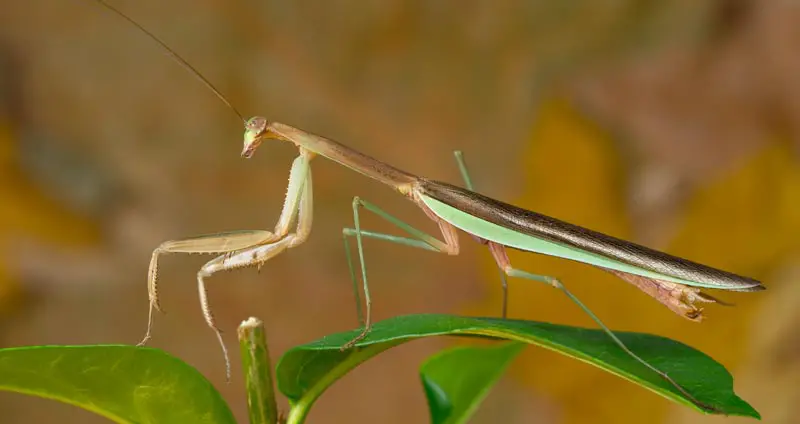
This is one of the most common mantises out there. The Chinese mantis is easily recognizable by this taut brown body. Though, some of its fellow species boast a bright green color.
In captivity, a Chinese mantis can live for 6 to 9 months. Among its counterparts, this is considered a fairly long lifespan.
Female Lifespan
- 6 – 9 months
Male Lifespan
- 4 – 8 months
Carolina Mantis
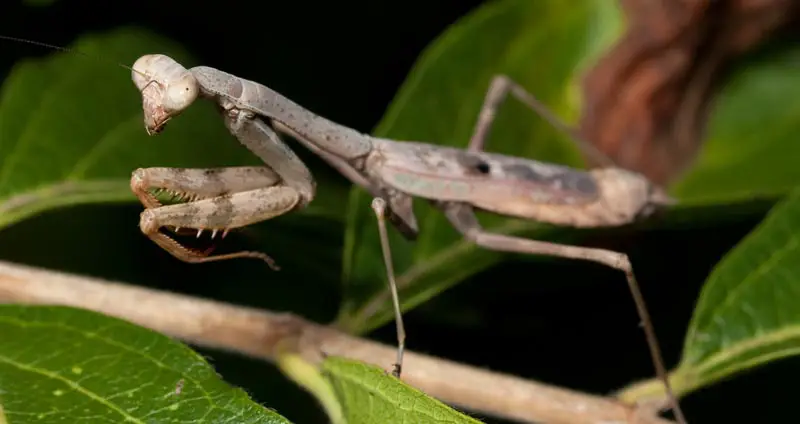
Indicative of its name, this mantis is the state insect of South Carolina. It’s commonly used as biological pest control, as it’s a fierce predator.
The Carolina mantis has a lifespan of 10 months. However, it can last up to 14 months when in captivity. Nymphs die after reaching maturity by 3 – 8 months.
Female Lifespan
- 10 – 14 months
Male Lifespan
- 10 months
Giant Asian Mantis
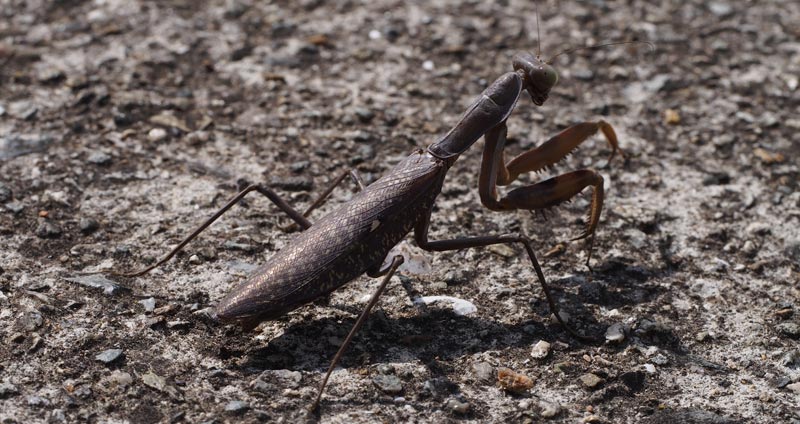
This is a fairly common mantis among many hobbyists. It’s because such mantises are low-maintenance and uniquely large. Adult females are about 3.5 inches, while males are about 3 inches.
The lifespan of this mantis is a little longer than you’d expect. It can live up to 18 – 24 months.
Female Lifespan
- 20 – 24 months
Male Lifespan
- 18 months
Orchid Mantis
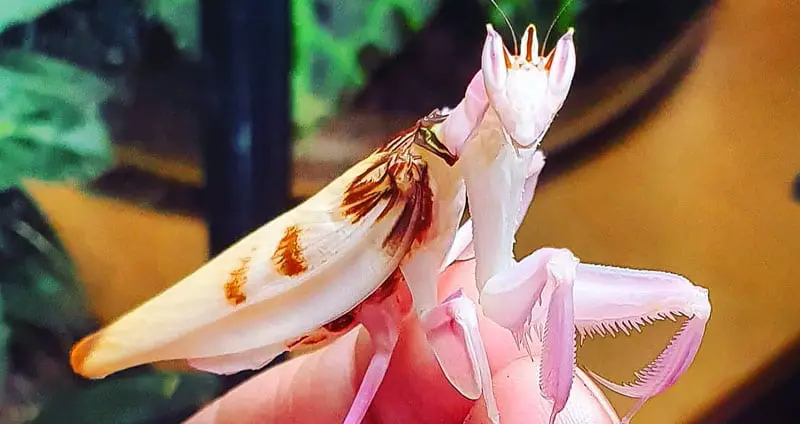
The petal-like orchid mantis is known for its beautiful appearance. It bears intense resemblance to orchid flowers, hence the name. Such a mantis uses its delicate exterior to attract prey.
The average lifespan of such a mantis is six months.
Female Lifespan
- 8 months
Male Lifespan
- 5 – 6 months
Devil’s Flower Mantis
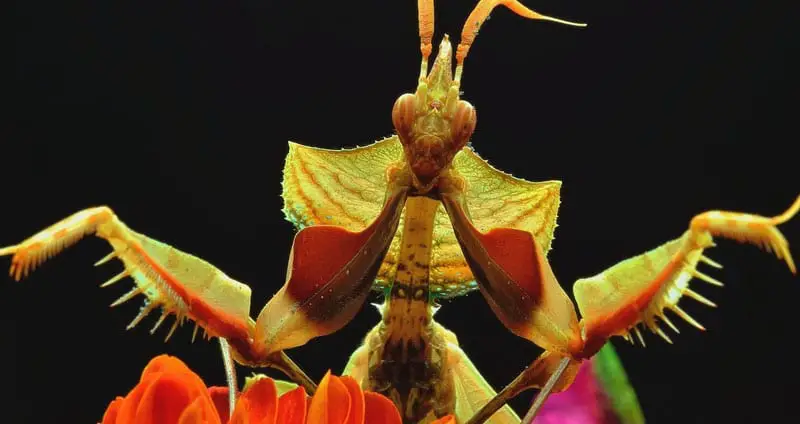
This is another mantis that mimics flowers. However, while the orchid mantis boasts a delicate appearance, the devil’s flower mantis is intimidating. Its scientific name is Idolomantis diabolica, with ‘diabolica’ translating to ‘diabolical’ in English.
The lifespan of the devil’s flower mantis is 12 months. However, it could change according to the environment.
Female Lifespan
- 12 – 18 months
Male Lifespan
- 12 months
Wandering Violin Mantis
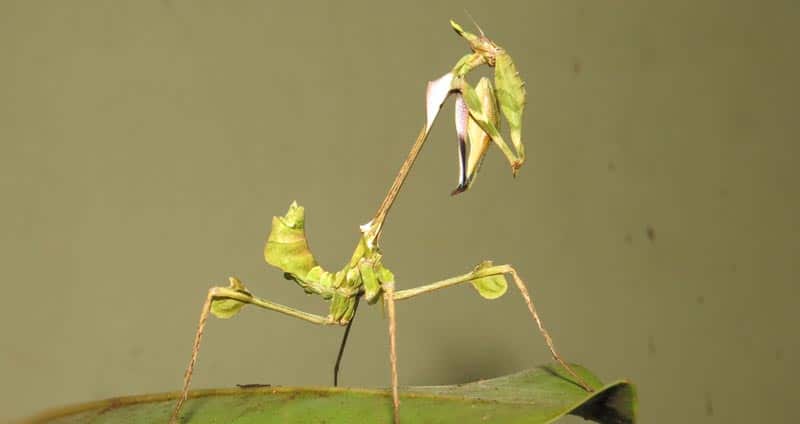
Due to its highly-prized appearance, this mantis is often treasured by hobbyists. Its large yet thin body resembles a cross between a dried leaf and a wooden stick. This is helpful in camouflage in some environments.
The average lifespan of the wandering violin mantis is 12 months.
Female Lifespan
- 8 – 12 months
Male Lifespan
- 3 – 6 months
Factors Affecting Lifespan
The variation in lifespan between mantises isn’t random. It depends on several factors. These factors include food, the environment, and even size.
Food
Food can play an important role in deciding a mantis’ lifespan. Its amount and quality affect how long a mantis lives. The bigger the amount, the longer a mantis will live.
While you should ensure the availability of food, don’t overfeed it. This can affect its lifespan negatively.
Moreover, you can even extend a mantis’ lifespan through its diet. Many owners resort to feeding their mantises with a syringe. This can make it stay hydrated, especially towards the end of its life. While it might not make a significant change, this can lengthen its lifespan by a month or so than expected.
Species
It’s a predetermined factor. The size of the species is indicative of its lifespan. By looking at a mantis, you can roughly estimate how long it’s going to live.
A bigger mantis lives longer than a smaller one. When it comes to the praying mantis, this is no exception. Smaller mantises can live for 4 – 8 weeks. However, bigger mantises can live for 4 – 6 months.
Usually, a praying mantis takes 4 – 6 months to reach the stage of maturity. When it does, it’ll continue to live for another 3 – 8 months.
A female mantis doesn’t live for long after laying eggs. She (if not dead two weeks after) has less than four months to live.
Female mantises tend to be larger and heavier than males mantises. They also tend to live longer, which is partially due to sexual cannibalism.
Environment
For the praying mantis, the environment is extremely important. It can determine whether it’ll live for 6 or 12 months.
To extend a mantis’ lifespan, prepare the optimal environment for it. Keep the temperature relatively cool.
However, don’t go too far below what’s preferable. This can provoke the opposite result. In some cases, a mantis can even die at an overly cool temperature.
Conclusion
The Ancient Egyptians used to believe that mantises possessed supernatural powers. They were also mentioned in multiple religious texts. One was even found mummified. Who could blame them?
Compared to humans, a mantis’ 6 -12 months lifespan passes in the blink of an eye. Yet, however long it lives for, this creature remains as fascinating as ever.

